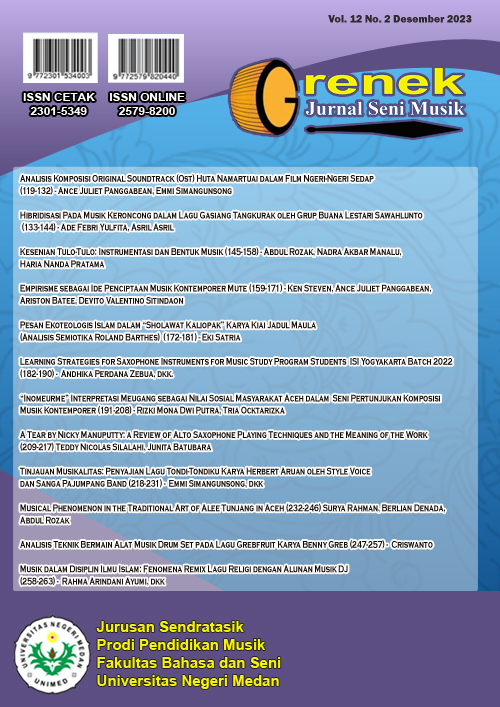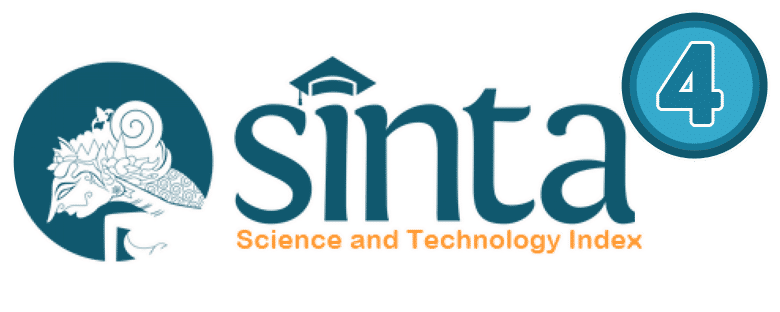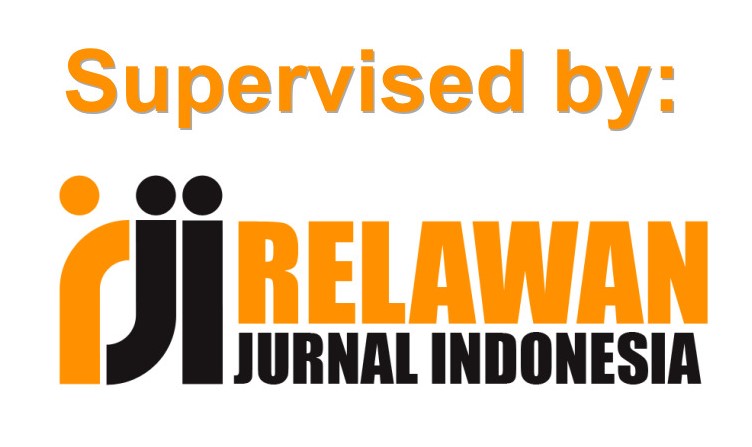Learning Strategies for Saxophone Instruments for Music Study Program Students ISI Yogyakarta Batch 2022
DOI:
https://doi.org/10.24114/grenek.v12i2.45389Keywords:
Saxophone Learning, ISI Yogyakarta 2022 Music Study Program, Learning StrategiesAbstract
The ISI Yogyakarta music study program currently refers more to the study of art. This resulted in a reduction in the study period for major instruments for students to 3 semesters. The music study program which focuses more on music studies targets students to become researchers and writers, so that the ability to play music is not too much considered when selecting new student admissions. Many students have shifted their instrument focus to other instruments they are not good at. The author focuses on saxophone instrument students class of 2022, most of whom experience this. This study aims to observe and describe the strategies and learning processes for the saxophone instrument course for students of the ISI Yogyakarta music study program class of 2022. The method used is qualitative-descriptive, with data collection through direct observation and interviews with students and supporting lecturers. Several lists of questions have been prepared and will serve as a tool for data collection. The author also made direct observations of the learning process carried out by lecturers and students in the saxophone instrument course. The research findings regarding the learning strategies applied are the design of a new syllabus consisting of several points to be presented to students as well as the establishment of good relationships and interactions between students and lecturers to create a comfortable learning atmosphere. The syllabus refers to the old syllabus which was previously carried out for 6 semesters, but now it is condensed into 3 semesters.References
Ahadian, M. (2016). Pembelajaran Saxophone Tingkat Dasar di Sinfonia Music School. Doctoral dissertation, Universitas Pendidikan Indonesia. http://repository.upi.edu/id/eprint/25495
Bureau of Personnel Administration, Career and Information. (2022). Brief History of Saxophone. Medan Area University. https://bakri.uma.ac.id/saxophone/
Hager, P. (2004). The competence affair, or why vocational education and training urgently needs a new understanding of learning. Journal of Vocational Education and Training, 56(3), 409“433. Doi: https://doi.org/10.1080/13636820400200262
Hasan, M., Harahap, T. K., Hasibuan, S., Rodliyah, I., Thalhah, S. Z., Rakhman, C. U., Ratnaningsih, P. W., Mattunruang, A. A., Silalahi, D. E., & Hasyim, S. H. (2023). Metode penelitian kualitatif. Surakarta: Penerbit Tahta Media. Retrieved from https://tahtamedia.co.id/index.php/issj/article/view/182
Indrawan, A., Widodo, T. W., & Suryati, S. (2020). The Early Development of Western Music Study Programs at Yogyakarta Indonesian Institute of the Arts until 2006. In Proceedings of the 1st International Conference on Interdisciplinary Arts and Humanities (ICONARTIES 2019), 531-539. http://iconarties.isi.ac.id/2019
Jungate, K., Chuangprakhon, S., Seekhunlio, W., & Theerapan, S. (2022). Conditions and Problems of Instructional Management in Saxophone Practical Skills Course in Higher Education Institutions in Thailand. Journal of Educational Issues, 8(2), 895. Doi: https://doi.org/10.5296/JEI.V8I2.20509
Kania, S. (2016). Proses Pembelajaran Saxophone Untuk Pemula di Dotodo Music Edutainment. Doctoral dissertation, Universitas Pendidikan Indonesia. http://repository.upi.edu/id/eprint/25101
Lyu, Y., & Hou, Y. (2023). Reform and innovation of saxophone teaching mode in colleges and universities based on Bayesian model. Applied Mathematics and Nonlinear Sciences. Doi: https://doi.org/10.2478/amns.2023.2.00155
Mutiara, V. (2021). Strategi Pembelajaran Daring dalam Mata Kuliah Piano Performance Di Departemen Pendidikan Musik UPI. Doctoral dissertation, Universitas Pendidikan Indonesia. https://repository.upi.edu/67878/
Nugrahani, F., & Hum, M. (2014). Metode penelitian kualitatif. Solo: Cakra Books, 1(1), 3“4. http://repository.stikim.ac.id/file/21-07-1730.pdf
Nugroho, T. S. A., & Kusumaningrum, M. R. M. (2021). Strategi Pembelajaran Daring Praktik Vokal di Prodi Musik Fakultas Seni Pertunjukan ISI Yogyakarta. Tamumatra: Jurnal Seni Pertunjukan, 4(1), 1-8. Doi: https://doi.org/10.29408/tmmt.v4i1.4018
Patmawati, K., Puspitasari, N., Mutmainah, S. N., & Prayitno, B. E. (2019). Profil Kemampuan Berfikir Kreatif Ditinjau dari Kemampuan Akademik Mahasiswa. Edu Sains: Jurnal Pendidikan Sains Dan Matematika, 7(2), 11“18. Doi: https://doi.org/10.23971/EDS.V7I2.1386
Profil Jurusan “ Jurusan Musik. (2021). https://musik.isi.ac.id/profil/
Purba, E. D. (2020). Media Pembelajaran Solfegio Dimasa Pandemi Covid-19 Prodi Musik FSP ISI Yogyakarta. Grenek: Jurnal Seni Musik, 10(2), 92“104. Doi: https://doi.org/10.24114/grenek.v10i2.29013
Purba, E. D., & Barus, H. N. (2020). Implementasi Teknik Dasar Istrument Trompet Pada Mahasiswa Prodi Musik, FSP, ISI YOGYAKARTA. Grenek: Jurnal Seni Musik, 9(2), 83“94. Doi: https://doi.org/10.24114/grenek.v9i2.20312
Ramafisela, L. (2023). Penerapan Metode Drill dalam Pembelajaran Harmoni Manual. Grenek: Jurnal Seni Musik, 12(1), 74“81. Doi: https://doi.org/10.24114/GRENEK.V12I1.45202
Sejarah “ Jurusan Musik. (2021). https://musik.isi.ac.id/profil/sejarah-jurusan-musik/
Setiarini, A. T. (2023). Scat Singing Learning Method in Jazz Vocals for Vocal Students of Music Presentation Institut Seni Indonesia Yogyakarta. Grenek: Jurnal Seni Musik, 12(1), 110“118. Doi: https://doi.org/10.24114/GRENEK.V12I1.39747
Suryati, S., & Widodo, T. W. (2020). Sight Singing sebagai Strategi Pembelajaran Instrumen Piano di Prodi Pendidikan Musik ISI Yogyakarta. Resital: Jurnal Seni Pertunjukan, 21(2), 99“112. Doi: 10.24821/resital.v21i2.3379
Ukshini, E., & Dirckx, J. J. J. (2023). Objective characterization of saxophone mouthpiece playability. Applied Acoustics, 206, 109309. Doi: https://doi.org/10.1016/J.APACOUST.2023.109309
Downloads
Published
Issue
Section
License
Copyright (c) 2023 Andhika Perdana Zebua, Boy Lamris I Simamora, Bowie Putra Bayu Mukti, Ezra Deardo Purba

This work is licensed under a Creative Commons Attribution-ShareAlike 4.0 International License.
Authors published with the Grenek: Jurnal Seni Musik agree to the following terms:
- Authors retain copyright and grant the journal the right of first publication with the work simultaneously licensed under a Creative Commons Attribution License (CC BY-SA 4.0) that allows others to share the work with an acknowledgment of the work's authorship and initial publication in this journal.
- Authors are able to enter into separate, additional contractual arrangements for the non-exclusive distribution of the journal's published version of the work (e.g., post it to an institutional repository or publish it in a book), with an acknowledgment of its initial publication in this journal.
- Authors are permitted and encouraged to post their work online (e.g., in institutional repositories or on their website) prior to and during the submission process, as it can lead to productive exchanges, as well as earlier and greater citation of published work. (See The Effect of Open Access)








